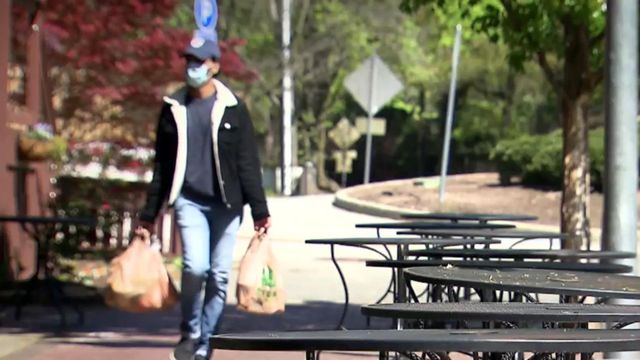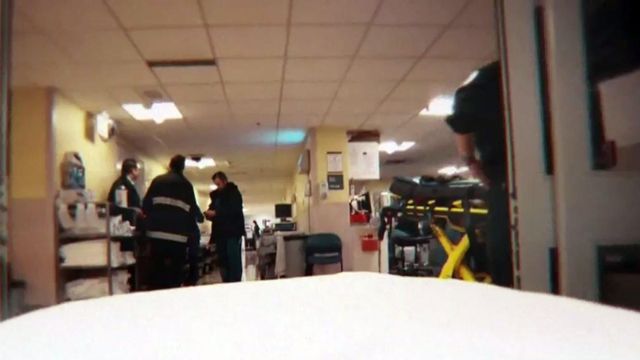Nurses, Tillis say NC stay-at-home restrictions need to remain in place
Hundreds of people marched through downtown Raleigh on Tuesday demanding that state leaders reopen businesses shuttered during the coronavirus outbreak. The effort disappointed nurses caring for virus patients and even Republican U.S. Sen. Thom Tillis, who said it's too early to relax restrictions under the stay-at-home order Gov. Roy Cooper issued last month.
Posted — UpdatedThe effort disappointed nurses caring for virus patients and even Republican U.S. Sen. Thom Tillis, who said it's too early to relax restrictions under the stay-at-home order Gov. Roy Cooper issued last month.
"We have not hit the peak of the curve yet," Tillis said in a telephone town hall meeting on Wednesday.
The rolling average of new coronavirus cases in the state hit a new high Wednesday of 300 per day over the past week. Likewise, the rolling average of deaths was at a high of 18 per day during that time.
Only after cases start trending downward, Tillis said, "is when we can start having a discussion about opening the economy and opening certain areas of the state."
"We still have a significant number of people in North Carolina who are not heeding the advice on social distancing and wearing facial coverings when they go out," he said. "When I have gone out, I have worn a mask, and I have been surprised and disappointed to see the number of people who aren’t."
"[I'm] trying to encourage the governor to open the state again," Forest told NeuseNews.com, a Kinston-based online news site. "There are a number of counties in our state that could open up right now based on the case count."
Seven of North Carolina's 100 counties have yet to report a virus infection.
Cooper said Tuesday that he plans to lay out plans to ease the stay-at-home restrictions – his order runs through the end of the month – but he has insisted that it will happen only after there is a downward trend in new infections and deaths and when North Carolina has the capacity for extensive testing and contact tracing to head off any new outbreaks.
"We are tracking all the data on a county-by-county level, and I think the governor will use that information to ultimately make policy decisions in May and June," Tillis said.
The reopening process will likely slow, allowing businesses to restart so long as they protect workers and customers. Business leaders are already discussing, as part of three state working groups, how to operate while continuing efforts to limit the spread of the virus.
"The concept of social distancing is probably with us through the summer," Tillis said.
Likewise, it will likely be a while before public schools in North Carolina reopen, he said.
"I could easily see where they may be delaying the opening, so then it raises the questions of when they would reopen or how they will dispose of the school year," he said.
Schools are closed through May 15, and Cooper said he will soon provide an update on whether that date will be pushed back further.
"On the whole, I believe the governor and local elected officials have done a good job, given all the uncertainty and the response," Tillis said. "I don’t think the public is doing as much as they could to help prevent the spread."
Nurses call virus 'scary'
Nurses Bevin Strickland and Crystal Hash said the protesters wouldn't be pushing so hard to reopen businesses in the middle of a pandemic if they could see the impact of the virus firsthand.
"I really wish I could videotape everything in the [emergency department]. I wish I could wear a GoPro so they could see how the patients look, how tragic it is," said Strickland, a single mother from High Point who volunteered for a two-month stint at Mount Sinai Medical Center in New York City, the hottest of virus hotspots in the U.S.
"Why do we have to see tragedy happen to make it real? It's always after something happens that we have to learn our lesson. People should know better," she said. "It has nothing to do with liberty and freedoms. Nobody’s trying to take anyone’s freedoms away. Everyone is trying to keep people safe."
Hash, a Duke Regional Hospital emergency room nurse who is finishing up her bachelor's degree in nursing at the University of Mount Olive, said reopening the economy too early will create "a roller-coaster ride."
"You say you want to open up society again, but what you’re really doing it inhibiting us from opening up society and the economy for, I don’t know, six to nine months," she said. "It’s going to keep opening up and closing us back down the more you spread it."
Both nurses described the coronavirus and its COVID-19 illness as scary.
"COVID can latch onto a 30-year-old person, or it can latch onto a 90-year-old person," Hash said, noting that the patients usually die alone. "As a nurse, all we can do is hold their hand, hold a phone up to their ear and let their family members say good-bye to them."
"When it happens it’s so fast," Strickland said. "The family has no idea what’s going on. When they die, they don’t even know they’ve died."
Mount Sinai's emergency department has been overrun with COVID-19 patients, she said.
"There’s just too many patients and too many other patients that need you to keep going, and it’s really sad because there is a person lying there who just passed away," she said. "It’s heartbreaking and it’s bizarre because you have to put it on the back burner, because if you stand there and think about it, you’re like, 'God, someone just died. We need to stop,' but you can’t do that. EMS is bringing in people constantly."
Strickland said protesters shouldn't think the virus outbreak is a New York problem and will never hit North Carolina.
"If we even had a fraction of that outbreak, it would be devastating," she said. "I want people not to have experience it themselves or see it happen to a loved one to believe that it’s real and to believe how scary it is."
"It’s really scary, and people should really, really stay at home and distance yourself as much as you can," Hash said.
Related Topics
• Credits
Copyright 2024 by Capitol Broadcasting Company. All rights reserved. This material may not be published, broadcast, rewritten or redistributed.






